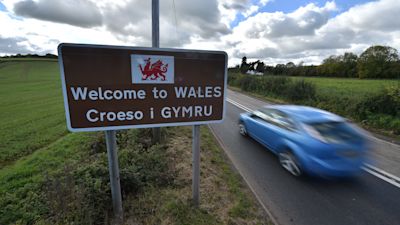'Anti-English' and 'unconstitutional': Criticism mounts on First Minister following travel ban announcement

Criticism has mounted against the First Minister's decision to impose a ban on people travelling into Wales from other areas of the UK with high levels of Covid-19 transmission.
Both the Police Federation of England and Wales and several Conservative politicians condemned the policy, pointing out difficulties with enforcement as one of the issues.
One Welsh MP said the new rule was more "anti-English" than "anti-Covid" while the Leader of the House of Commons claimed it was "unconstitutional".
The First Minister announced the travel ban on Wednesday, after repeated calls on the Prime Minister to enforce the restriction were ignored.
The Welsh Government will introduce the ban by 6pm on Friday 16, should Boris Johnson not bring in his own measures to the same effect before that date.
Mark Drakeford defended the decision, claiming that officers will use a "range of techniques" to catch rule-breakers.
Welsh Government confirmed that fines for breaking the travel rule would be the same as those issued for breaching other coronavirus regulations.
This means a fixed penalty notice of £60 would be issued for a first offence, doubling for each repeated offence up to a maximum of £1,920. If taken to court over the matter, an even larger fine can be imposed.
Alun Cairns, Conservative MP for the Vale of Glamorgan and former Secretary of State for Wales, said: "I think the divisive nature of such a policy is dangerous.
"In England, in the high risk and they very high risk areas in the three-tier system, there's clear advice that people shouldn't be travelling.
"But to create a physical barrier or a policy barrier that is so clear and stark between Wales and England, at a time when we've been trying to open the borders, I think the tone and the language that the First Minister is using is quite dangerous."
Fellow Conservative MP, Jacob Rees-Mogg also criticised the stricter measures and called them "unconstitutional".
During business questions in the House of Commons, Mr Rees-Mogg was asked if the travel ban would be "illegal" for Welsh Government to introduce.
Mr Rees Mogg replied: "What would you expect of a hard-left Labour Government?
He said the rule would put "police in an invidious position" and that there should not be "borders between different parts of the United Kingdom."
He added: "And I'm afraid that is what you get when you vote for socialists."
The Welsh Secretary of State called for urgent clarity around the regulations. Simon Hart wrote a letter to the First Minister in which he said he is "worried that, without rapid explanation, this approach risks stirring division and confusion in Wales".
The Welsh lead of the Police Federation of England and Wales described the travel ban as "unenforceable".
Mark Bleasdale said: "On the face of it, this is unenforceable because of the difficulty of identifying where people are coming from and where they are going to."
He said the travel restrictions were easier to enforce during national lockdown - when there was a blanket rule for England and Wales.
Mr Bleasdale explained: "This time, we've got situations where there are certain parts of England that people can travel into Wales and certain parts that can't.
"Then also within Wales, we've got different lockdown provisions, so there is quite a high number of counties that people can't travel in and out of without good reason.
"It looks like a very complicated picture for those frontline officers."
Mr Drakeford told BBC Breakfast that number plate recognition would be one of the ways the rule would be enforced.
He said: "Number plates are one of the ways in which they are able to identify cars that are travelling long distances, but that won't be the only way.
"They will have long-practice techniques developed earlier in the year, and they will apply those again over the weeks to come."
During the national lockdown, people in Wales were not allowed to travel further than five miles from their home without a reasonable excuse.
Those who breached the rules faced a £60 fine, with Wales' four police forces regularly sharing instances of travellers being caught out.
Figures published after the five-mile rule ended in July showed that out of the 281 fines issues in north Wales, 81 involved local residents, while 188 involved visitors from England.
The English areas which had the highest proportion of offenders were Merseyside, the West Midlands, Cheshire, and Greater Manchester - areas which are all now subject to tightened restrictions.
The UK Government said it was "disappointing" that the Welsh Government "chose to act unilaterally".
But Scotland's First Minister, Nicola Sturgeon, backed Mark Drakeford after he announced the plans.
"These are public health decisions, and nothing to do with constitutional or political debates," she said in a social media post.